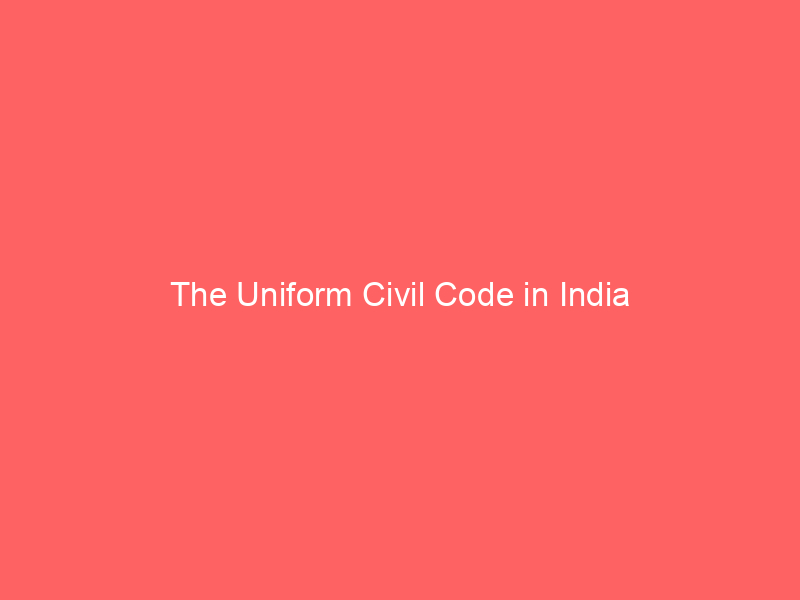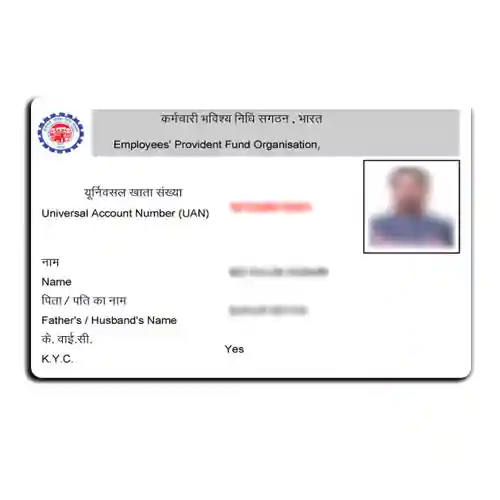Blog
The Uniform Civil Code in India
The Uniform Civil Code (UCC) is a proposed set of personal laws that would apply to all citizens of India, regardless of their religion. The concept of a UCC has been a topic of discussion and debate in India for many years, but it has yet to be implemented. This blog aims to provide a comprehensive exploration of the UCC, examining the arguments in favor of and against it, discussing its potential benefits and challenges, and shedding light on the ongoing discourse surrounding its implementation.
The idea behind the UCC is to promote equality among all citizens by creating a uniform set of laws that apply to everyone, regardless of their religious beliefs. Currently, different personal laws govern various religious communities in India, leading to disparities and potential discrimination. For instance, under Muslim personal law, a man can have up to four wives, while Hindu personal law does not allow for polygamy. The UCC aims to eliminate such discrepancies and ensure that all citizens are treated equally under the law.
One of the main advantages of implementing the UCC is the simplification of the legal system. Currently, there are multiple personal laws that can be confusing and difficult to navigate. By introducing a single set of laws applicable to all citizens, the UCC would streamline the legal framework, making it more accessible and understandable for everyone. This simplification would not only benefit individuals seeking legal guidance but also contribute to a more efficient judicial system.
Another crucial aspect of the UCC is its potential to promote social justice. Some existing personal laws in India have been criticized for discriminating against women and other marginalized groups. For instance, Hindu personal law stipulates that a woman’s property automatically passes to her husband or in-laws upon her death, even if she has children. Implementing the UCC would ensure that all citizens, regardless of their gender or social status, have equal rights and protections under the law. This step toward social justice is a significant driving force behind the push for a UCC.
However, despite these arguments in favor of the UCC, there are also valid concerns raised by those who oppose its implementation. One prominent concern is that the UCC might violate the right to freedom of religion. India is a diverse country with numerous religions and cultural practices, and some argue that a uniform code might infringe upon the religious freedoms of different communities. They argue that personal laws should be left to religious communities to govern, as they have been for centuries.
Furthermore, critics contend that implementing the UCC would be a challenging task due to the vast cultural and religious diversity within India. Each religious community has its own traditions, customs, and practices, and attempting to create a single set of laws acceptable to all might not be feasible. They argue that any attempt to impose a uniform code could lead to social unrest and conflict, further exacerbating religious tensions.
While the UCC remains a popular idea among many in India, it has not yet been implemented. The government has expressed its commitment to enacting the UCC but has not announced a specific timeline for its implementation. The ongoing debate surrounding the UCC reflects the complexity of the issue and the need for careful consideration.
In conclusion, the Uniform Civil Code is a complex and controversial topic that warrants extensive discussion. The UCC has the potential to promote equality, simplify the legal system, and ensure social justice for all citizens. However, it is crucial to address concerns related to religious freedom and cultural diversity. Implementing the UCC requires a balanced approach that respects individual rights while striving for a more equitable society. The ongoing debate surrounding the UCC is crucial as it delves into fundamental questions about the role of religion in the Indian state and the nature of equality in a diverse society.
Positive points
- Promotes equality among all citizens, regardless of their religion.
- Simplifies the legal system and makes it more accessible to everyone.
- Promotes social justice and protects the rights of women and other marginalized groups.
- Can help to unify the country and create a more cohesive society.
Negative points
- Could be seen as an infringement on religious freedom.
- Could be difficult to implement and enforce, especially in a country as diverse as India.
- Could be met with resistance from religious groups.
- Could lead to social unrest and conflict.
It is important to weigh the pros and cons of the Uniform Civil Code carefully before making a decision about whether or not to implement it. There are strong arguments on both sides of the issue, and it is a complex and sensitive matter.
Here are some additional points that could be included in the blog:
- The history of the UCC in India, dating back to the time of the British Raj.
- The different personal laws that currently exist in India, and how they vary from religion to religion.
- The views of different religious groups on the UCC, and how they have evolved over time.
- The challenges and obstacles that would need to be overcome in order to implement the UCC in India.
- The potential benefits and drawbacks of the UCC, both for individuals and for society as a whole.
What types of cards do you offer?
We offer PVC card printing services for a wide range of documents, including Driving licenses, RC books, ration cards, health cards, PAN cards, ID cards, and more. Simply let us know what you would like to print on a PVC card, and we will do our best to accommodate your needs.
What materials do you use for printing?
We use high-quality PVC sheets imported from trusted sources for all of our card printing. This ensures that your cards will be durable and long-lasting.
Can I customize my cards?
Yes, you can customize your cards with your own design or text. However, please note that we do not edit any government ID documents that are used for identification purposes, such as driving licenses, Any PVC Card PAN cards, and other government IDs
What is the turnaround time for orders?
Our standard turnaround time for orders is 8-10 business days, including 1-2 days for printing and the transit time of the carrier. We offer a range of shipping options at different price points, including registered post, semi-express, express, and Bluedart. Delivery times may vary depending on the carrier and are beyond our control. Please see the following table for shipping options and estimated delivery times:
| Shipping Option | Price | Estimated Delivery Time |
| Registered Post | INR 40 | 8-10 business days |
| Speed Post | INR 60 | 5-6 business days |
| DTDC | INR 100 | 4-6 business days |
| Bluedart | INR 200 | 4-5 business days |
How do I place an order?
To place an order, simply follow these steps:
- Go to the product page on our website and click on the “Upload” section.
- Upload an image of the front and back sides of your card in PDF, JPEG, or PNG format. If you have a single file that contains both the front and back sides, you can upload it in the “Front” field and we will automatically separate the front and back sides for you. If your file is password-protected, be sure to include the password in the designated field.
- Click the “Add to Cart” button to add your order to your cart.
- Follow the prompts to complete the checkout process and submit your order.
What is your return policy?
As we offer printing services, we are unable to accept returns or issue refunds. We recommend double-checking your files before uploading them to ensure that they are correct. If you need to make changes to your file after uploading it, please contact our support team immediately. We may be able to exchange your file before it is printed, but this will incur additional charges. Please note that once a card has been printed, we are unable to make any changes or exchanges
How do I track my order?
Yes, you can track your order by using the tracking number provided to you. We will send you a photo of your card and the tracking information via WhatsApp to the number you registered with us, as well as via email to the address you registered with us. You can then use the tracking number to track your order on the carrier’s official website. If you have any difficulty tracking your order, please don’t hesitate to contact us for assistance.
Do you offer bulk discounts?
Yes, we do offer bulk discounts for orders of a certain minimum quantity (MOQ). For more information on our bulk discount rates and to place a bulk order, please contact our support team.
How do I contact customer support?
You can reach our customer support team through the following channels:
- Phone: Call 8668469325 or 9284608837. If you are unable to connect or do not receive a response, we will call you back as soon as possible.
- WhatsApp: Chat with us at 8668469325. Please note that we do not accept voice or video calls on WhatsApp.
- Email: Send us an email at care@pvccardprinting.in and we will get back to you as soon as possible.



